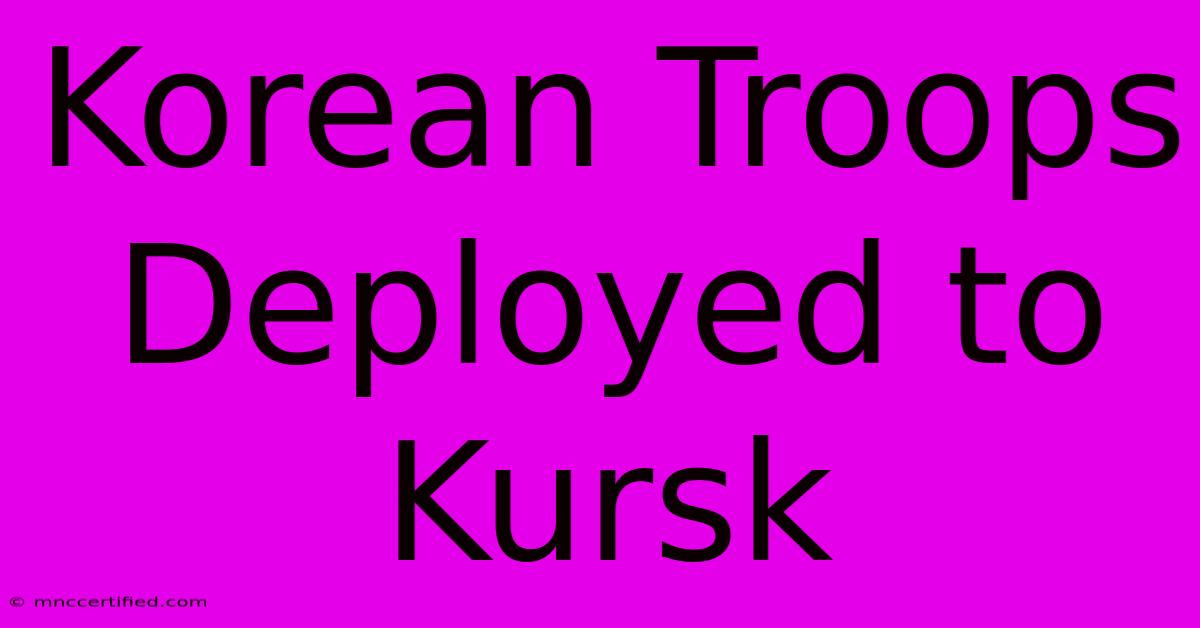Korean Troops Deployed To Kursk

Table of Contents
Korean Troops Deployed to Kursk: Separating Fact from Fiction
The claim of Korean troops being deployed to Kursk during any historical conflict requires careful examination. While the Korean War (1950-1953) was a significant global event, and the Battle of Kursk (1943) a pivotal moment in World War II, there's no historical evidence supporting the deployment of Korean troops to the Eastern Front of World War II, including the Kursk region.
This article will delve into why this assertion is highly improbable and explore the potential reasons for its propagation.
The Historical Context: Korean Involvement in World War II
Korea, under Japanese colonial rule from 1910 to 1945, was directly involved in World War II as part of the Empire of Japan. However, Korean participation was primarily forced labor and service within the Japanese Imperial Army. These soldiers fought primarily in the Pacific theater, not in Europe.
- Pacific Theater: Korean conscripts served in various capacities, including infantry, support roles, and even as forced laborers in regions occupied by Japan.
- No European Deployment: There are no credible historical accounts, military records, or scholarly works documenting Korean troops being deployed to the European theater, including the Battle of Kursk.
- Allied Forces at Kursk: The major combatants at Kursk were the Wehrmacht (Germany), the Red Army (Soviet Union), and, to a lesser extent, other Axis and Allied forces.
Debunking the Myth: Why the Claim is Unlikely
The idea of Korean troops fighting at Kursk is highly improbable due to several factors:
- Geographical Distance and Logistics: Transporting troops from Korea to the Eastern Front during World War II would have been a logistical nightmare, requiring vast resources and time – resources Japan heavily invested in the Pacific.
- Strategic Priorities: Japan's strategic priorities lay in the Pacific, where it was engaged in a brutal war against the United States and its allies. Diverting significant manpower to the European front would have been strategically unwise.
- Lack of Primary Sources: The absence of any corroborating evidence, including firsthand accounts, official documents, or photographic proof, further strengthens the argument against this claim.
Potential Reasons for the Misconception
The propagation of this false claim likely stems from several factors:
- Misinformation: The spread of inaccurate information online and through unreliable sources is a significant problem. Without proper fact-checking, unsubstantiated claims can easily gain traction.
- Confusion with Other Conflicts: The claim might be a result of confusion with other conflicts involving Korean soldiers, especially those who served under the Japanese Imperial Army in the Pacific.
- Propaganda or Fabrication: In some cases, false narratives are deliberately created for political or ideological reasons.
Conclusion: The Importance of Historical Accuracy
It's crucial to rely on reliable historical sources and critically evaluate information before accepting it as fact. The assertion of Korean troops at Kursk lacks any credible supporting evidence. Understanding the historical context of both World War II and the Korean War is vital to separating fact from fiction. The propagation of misinformation undermines the accurate understanding of historical events. Always consult reputable historical sources and academic works for accurate information.
Keywords: Korean troops, Kursk, World War II, Korean War, Battle of Kursk, Eastern Front, Japanese Imperial Army, historical accuracy, misinformation, Pacific Theater, military history, historical facts, Korean conscripts, Korean soldiers, WWII, Soviet Union, Germany, Wehrmacht, Red Army.

Thank you for visiting our website wich cover about Korean Troops Deployed To Kursk. We hope the information provided has been useful to you. Feel free to contact us if you have any questions or need further assistance. See you next time and dont miss to bookmark.
Featured Posts
-
Starmer On A Serious Eu Partnership
Nov 19, 2024
-
Cancelling Oscar Health Insurance
Nov 19, 2024
-
Pakistan Vs Australia T20 Stoinis Match Highlights
Nov 19, 2024
-
Paytons Impact Bo Nixs Broncos Rise
Nov 19, 2024
-
Nations League Scotland Wins 2 1 Vs Poland
Nov 19, 2024